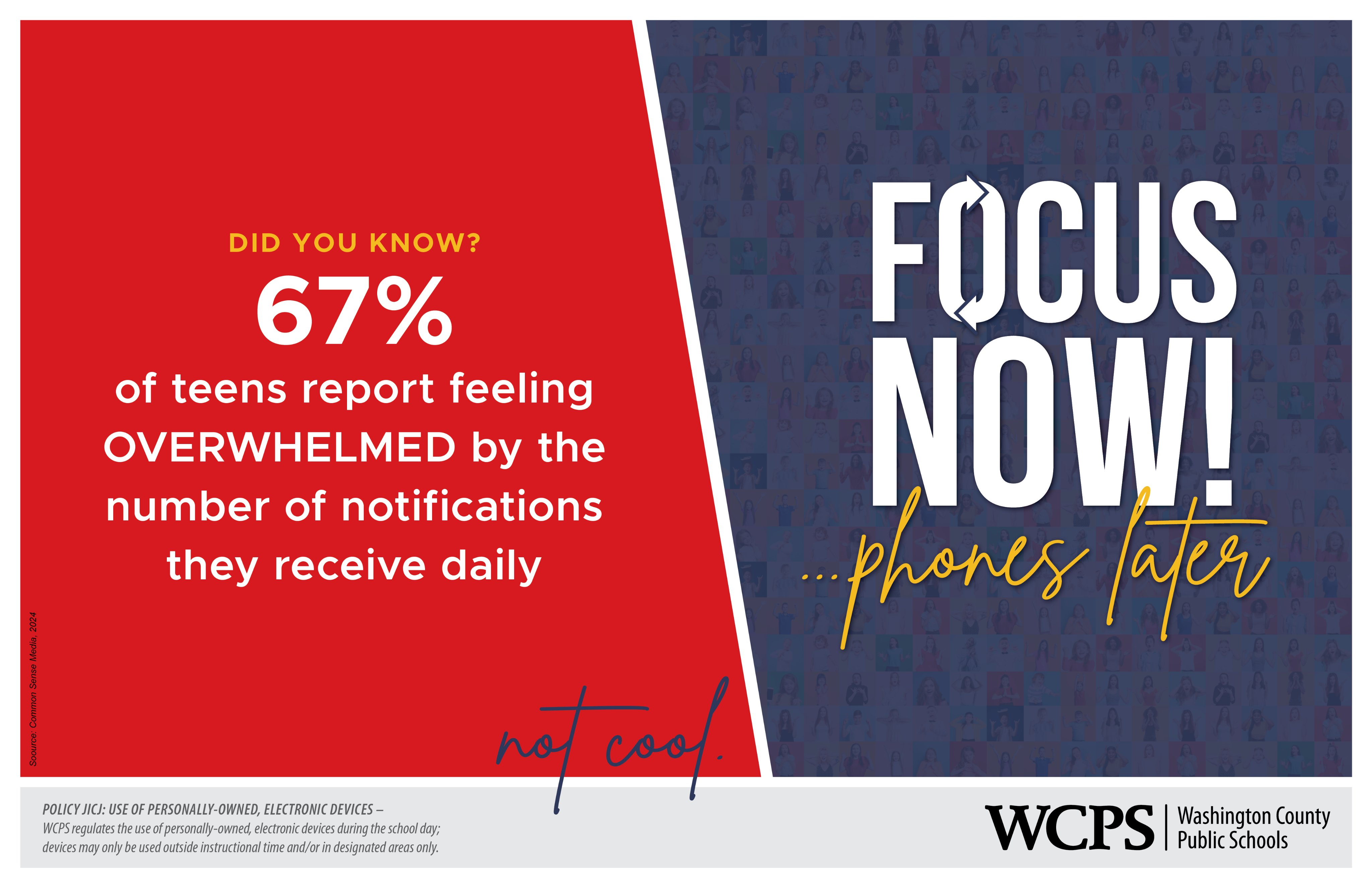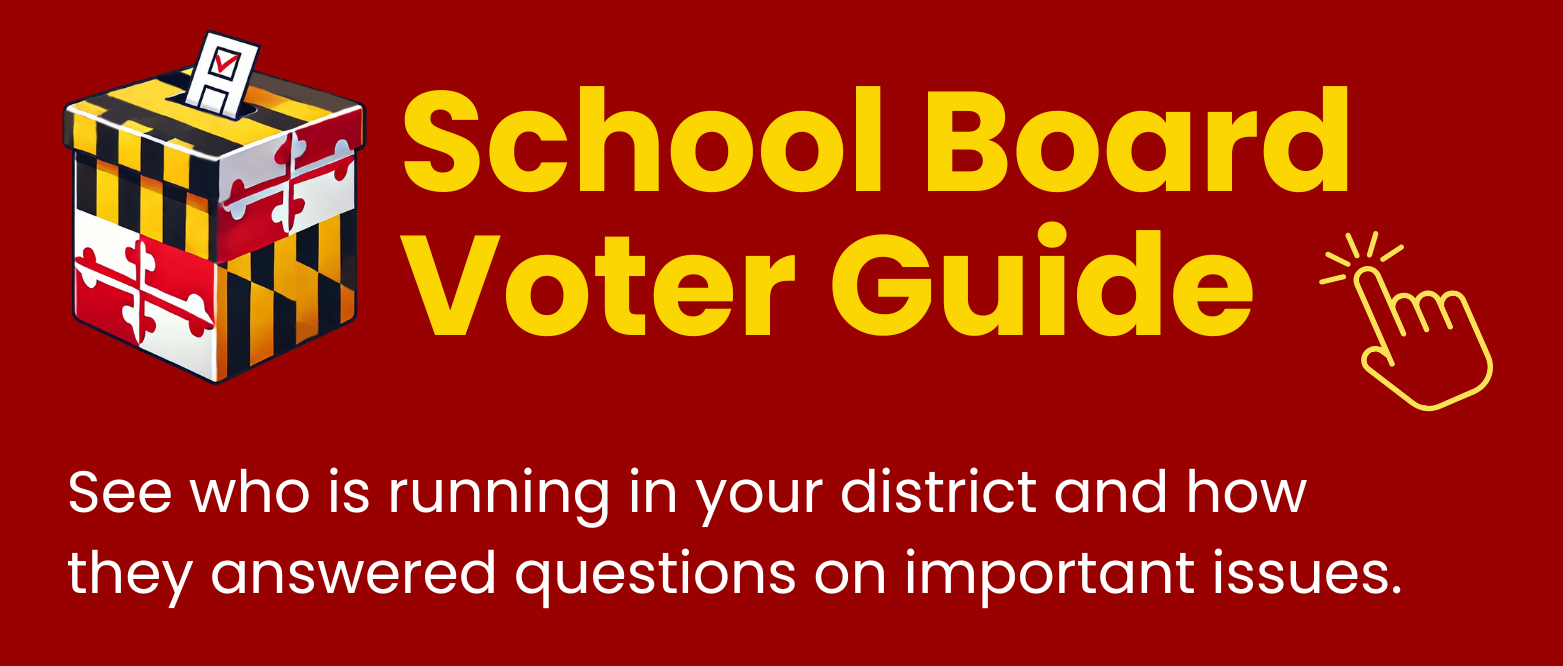This story is part of the Local News Network’s 2024 School Board Voter Guide.
“FOCUS NOW! PHONES LATER,” blares the newest school cellphone policy out of Washington County.
This “clear message” debuted on the county’s website in August, kicking off the 2024 school year with stricter limitations on personal electronic devices.
That message is one that resonates with Maryland’s school board candidates. Of the 74 candidates who responded to the Local News Network’s campaign questionnaire, 64 favored strict restrictions on cellphones in schools, and only 10 expressed reservations about limiting cellphone use or touted their positive aspects.
Board candidates cited a number of reasons – ranging from disciplinary issues to cyberbullying to phone addiction – for ordering students to put their phones out of sight.
Some candidates offered nuanced proposals for limiting cellphone use – but support for greater restrictions spans the state, from large counties to small.
Rita Montoya, a lawyer who is running for an at-large school board seat from Montgomery County, said the district’s cellphone policy should be “away all day” – which is the name of a pilot program in the district this year.
“As a parent, I understand the need for some students to have a cellphone with them at school, but it should not be used at school so as to limit distractions and negative peer interactions including violence,” she said.
Washington County already requires all devices to be off and out of sight during instructional hours in its schools. Robin Merchant Spickler, a former kindergarten teacher and current school board candidate in the western Maryland county, fully supports the new policy.
“This has been a long time coming. It is in the best interest of the students’ well-being and their academic progress,” she said. “It will help the students learn in a positive and productive environment.”
A growing trend
Schools across the state have already begun implementing stricter cellphone policies in public schools. According to a survey conducted by the Capital News Service this fall, at least a third of Maryland school districts have tightened their cellphone regulations this school year alone.
However, these policies vary. Some schools prohibit students from using their devices throughout the entire school day, while others, such as Anne Arundel County, allow high school students to use them during lunch only.
Some counties have begun forcing students to lock away their phones. In Baltimore County, 16 middle and high schools have issued clear pouches in which students must insert their phones to make them harder to access during class time.
Annette Anderson, the deputy director of the Johns Hopkins Center for Safe and Healthy Schools, said there are good reasons for mimimizing cellphone use among youngsters.
“What we know is that it’s shifting the way that the brains of the developing child is growing,” Anderson said. “There’s a lot of concern in terms of the mental health of our young people.”
Between 2008 and 2015, hospitals in the U.S. reported suicidal ideation or attempts among children and adolescents ages 14 to 18 almost doubled, according to a 2020 study. Published by the Canadian Medical Association Journal, the study delved into the relationship between youth cellphone and social media use and mental health.
The study found that internet addiction is “particularly associated” with self-harm and suicidal behavior.
Anderson said cellphone use also hinders students’ ability to develop interpersonal connections vital to job performance later in life.
“What’s happening actually is that students are so focused on this phone that’s in front of their faces that they’re not actually having interpersonal dialogue,” Anderson said. “They’re not having the kinds of conversations at the lunchroom, at the lunch table in their classrooms.”
Teachers nationwide are worried about cellphone use, too, according to a survey from the Pew Research Center from June. The survey found that 72 percent of high school teachers alone cite cellphone distractions in the classroom as a “major problem.”
Many school board candidates also said cellphones have become a distraction.
In Calvert County, cellphones are banned in classrooms, and school board candidate and former educator Michael Shisler backs that ban.
“This problem did not happen overnight, and it will not be solved overnight,” said Shisler, who spent nearly 30 years as an elementary school principal. “Cellphones have moved beyond a distraction to being an addiction – an addiction that brings increased social pressures and the need for constant social validation.”
Allegany County school board candidate and Frostburg State University professor Gerry LaFemina agreed. He said the impact cellphones and social media have on students is the most jarring problem in county schools that he hopes to address.
“Besides being a distraction, the dopamine hit of responding to notifications can have an addictive effect on our students. This can lead to educational and disciplinary issues,” LaFemina said.
LaFemina did not specify what policies he would implement if elected, but the county has light limitations on use in the classroom, often leaving it up to teacher discretion.
St. Mary’s County candidate Mary Washington, who has served on the board for the past 27 years, said she is pleased with the county’s new plan to restrict phone use during instructional time.
“This change will focus on increasing learning and achievement, promoting a safe and orderly school, diminishing discipline referrals, and nourishing more face-to-face contact with each other,” Washington said.
Different perspectives
While most school board candidates throughout the state provided a variety of concerns surrounding cellphone use in schools, many had different perspectives on what a ban should look like in their county.
Out of Prince George’s County, lawyer, substitute teacher and school board candidate Angela R. Jones said she supports tighter regulation but not a full ban.
“I propose a balanced cellphone policy that allows limited use during non-instructional times, such as lunch and between classes while prohibiting use during lessons,” said Jones, the legislative director for the Maryland State Senate. “This approach respects students’ need for connectivity and emergency contact while minimizing distractions during instructional time.”
In addition to the social connectivity phones can provide students, some candidates cited the educational use of devices in schools, saying they can be used in the classroom in moderation.
Letonya Smalls is also running for the school board in Charles County. She has a doctorate in education leadership and said she has seen students benefit directly from phone usage in the classroom.
“I remember one of my students pulling out his cellphone to take a picture years ago. I asked what he was doing, and he said, ‘I am taking a picture of the homework, Ms. Smalls,’” Smalls said. “He smiled, and I honestly didn’t make a big deal out of it because I knew it worked for him. Each student is different, and each student learns differently.”
Smalls proposed a strict policy enforced by teachers during instructional time but not a complete ban. However, like some other candidates, Smalls said she believes that students and parents should be involved in developing any new policy. She proposed a contract for cellphone use for both parents and students to review and sign.
In Frederick County, school board candidate Veronica Lowe took a similar stance.
“I don’t believe in creating a policy without fully understanding the issues and concerns that led to its development,” said Lowe, former director of transportation for Frederick County Schools. “We need to gather a collaborative group that includes parents, students, teachers, support staff, administrators, bus drivers and community members to ensure diverse perspectives are considered.”
Lowe also brought up the intersection of school safety and cellphone policy and said she believes that in light of recent school shootings, students need to have a way to communicate in emergencies.
And one candidate – Maisie T. Howard of Anne Arundel County – voiced concerns that a ban would do more harm than good, especially for special needs students, those from rural areas and those who thrive in virtual environments.
“The cellphone is not the enemy,” she said. “For many of us, it is our only computer.”
In contrast, some candidates, like Ann O’Connor from Talbot County, believe in a full ban in elementary and middle schools, along with emergency access only in high schools. O’Connor, a former high school Spanish teacher and mother of six, said she believes a tougher phone policy could decrease mental health issues, bullying and distraction in schools.
“If Talbot County wants to lead the way on protecting our kids from short attention spans and gaps in core knowledge, this is the No. 1 thing that needs to happen,” O’Connor said.
And O’Connor said those most in the know about the county’s schools agree with her.
“I have talked to a number of teachers about cellphone use in school, and they unanimously tell me the same thing,” O’Connor said. “Ban them.”
An earlier version of this story incorrectly said that Letonya Smalls is running for the board of education in Prince George’s County. She is a candidate in Charles County.



You must be logged in to post a comment.